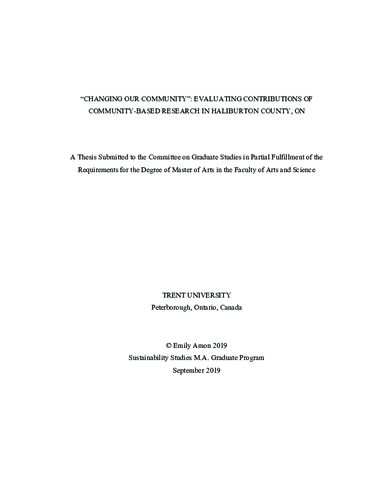Year: 2019, 2019
Member of: Trent University Graduate Thesis Collection
Abstract: <p>The "upfront" embodied carbon (EC) of building materials includes the accumulated greenhouse gas (GHG) emissions resulting from harvesting, manufacturing and transportation processes, and is becoming more widely recognized as a major source of global GHGs. The aim of this study is to demonstrate the potential for buildings to go beyond reduced or zero GHG emissions and to… more Year: 2019, 2019
Member of: Trent University Graduate Thesis Collection
Abstract: <p>Hunger is a significant concern in Canada, and even more so in the North, with 52% of Inuit adults in Arctic regions experiencing some level of food insecurity in 2012. Policy deficiencies are argued to, at the least, be partly responsible for this issue. This qualitative exploratory project aimed to answer the question: What is the role of food-related policy(ies) in household food… more Year: 2019, 2019
Member of: Trent University Graduate Thesis Collection
Abstract: <p>Blocking fossil fuel infrastructure projects like pipelines is increasingly being seen as a legitimate way for civil society groups to reduce global carbon emissions. This research project is an exploratory case study of the Trans Mountain pipeline in British Columbia and its opposition. My research question asks, 'What has each tactic/strategy of opposition in the campaign to stop… more Year: 2019, 2019
Member of: Trent University Graduate Thesis Collection
Abstract: <p>Community-based research (CBR) is a method of discovery that can provide pragmatic methods of advocating for and enabling community change. CBR literature and practice has focused on securing educational and job skills training outcomes for students rather than the communities, and community outcomes CBR and partnership frameworks were truly meant to serve. This research evaluates the… more Year: 2019, 2019
Member of: Trent University Graduate Thesis Collection
Abstract: <p>In current knowledge-based economy, knowledge might be viewed as the most valuable organizational resource in sustaining any organization. Organizational knowledge originates from cognitive learning by individuals situated within organizations. In organizational learning, situated learning of knowledge by individuals is shared to create sustainable organizational competency. Yet, there… more




